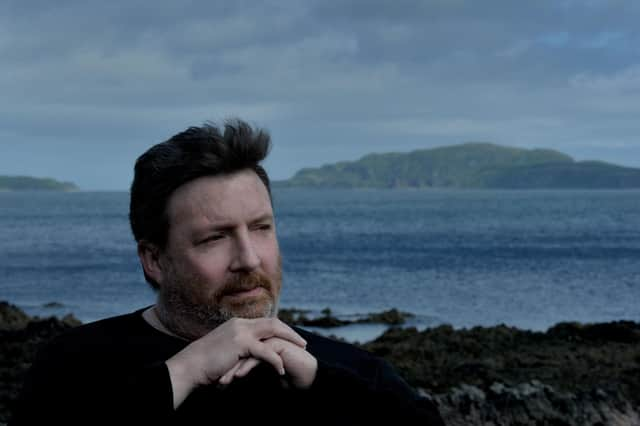Scottish author Denzil Meyrick tells Janet Christie about his Kintyre-set novels and his hopes for the planned TV crime drama series


We’ve all been isolated at times by lockdown but no one more so than Scottish crime writer Denzil Meyrick whose health has seen him staying indoors during the pandemic. With a heart condition and ankylosing spondylitis, a rare type of arthritis, he was holed up at home in Balloch with his wife Fiona, but without book festivals, tours and launches, was able to devote himself to writing.
“The advice for me was to stay indoors on my own personal lockdown and with a lot more time on my hands the best thing to do is write something,” he says.
‘Something’ is an understatement as his output includes the latest in the DCI Jim Daley series, his ninth, For Any Other Truth, as well as a new Sopranos-inspired standalone gangland thriller set in Paisley, Terms of Restitution and there’s also a new winter novel, A Toast to the Old Stones: A Tale from Kinoch. Set in the town where the Daley novels take place, in the 1960s and inspired by Meyrick’s hometown of Campbeltown, it has more of a comic flavour of Para Handy and Whisky Galore, than his crime thrillers.
When the former police officer’s first novel, Whisky from Small Glasses, was published in 2012 it became a hit, a series of books with more than a million readers was born. Now they’re being turned into an eight part TV series produced by Fudge Park (Inbetweeners) and Ocean Independent, with Meyrick also exec producing, directed by I Hate Suzie director Anthony Neilson, and with Rory McCann (Sandor Clegane in the Game of Thrones, Jumanji: The Next Level) playing the detective.
“Covid’s delayed the series a great deal, but people have died and tragedies have happened all over the place so I’m not going to get too melodramatic about that,” he says.
“The themes are things that affect everybody’s lives: love, hate, betrayal, laughter, tears, everything good drama is made of. There is what’s in the books, existing characters and showcasing the wonderful setting of Kintyre which has been underexposed for many years.”
Despite describing himself as ‘a wreck’ Meyrick is in good cheer and while his books are crime thrillers, they’re peppered with dark humour and lively characters. He eschews the label ‘Tartan Noir’.


“I wouldn’t call my books Noir, that’s black and bleak, and my books aren’t like that. My intention was to do crime novels with a bit of humour, not humorous novels with a bit of crime. My basis for that was the Sopranos. That mixture of visceral violence and really bad people, but as in Terms of Restitution, really bad people aren’t really bad all the time. Everyone’s rounded. Gangsters have mothers and fathers and daughters and sisters and friends and it’s the same with police officers. I find it difficult to watch these earnest police TV shows, where everything’s straight-faced and acronyms. If you go to a real police or fire station or ambulance service you find that dark humour is a very much a part of the makeup because they face the worst that humanity can throw at them, see harrowing things and face danger and life threatening situations. And the only way to leaven that is with dark humour.”
Writing his way through adversity is nothing new for Meyrick, who left the force after sustaining a back injury and subsequently worked as a director of an engineering company and distillery manager, as well as owning a number of his own companies and being a freelance journalist, and his first novel, Whisky from Small Glasses, was written while recuperating from illness.
“I lived with arthritis for years and it didn’t really bother me. All it did was ruin my golf swing. But I had a flare up and you’re basically bed bound, everything’s agony, so I had time to write the book I had always wanted and it was therapy more than anything else. I didn’t think it would get published but fortunately it's turned out the way it has.”
A crime novel was an obvious fit for Meyrick with his police background - but with his illness came the time to write full time and the DCI Daley series and a writing career was born.


“Then the treatment I was taking for arthritis made an underlying problem with my heart really bad and I nearly died in 2017. It was a sobering experience. I’m on the correct medication and I came back from that. The trick is to not let it get you down and just plough ahead regardless, in a sensible fashion.”
Did it give him a sense of urgency about his writing?
“It made me want to make more money!” he laughs. “I’d quite like to achieve more things, obviously in the TV sector as well - the adaptation is a natural progression and I’m very involved with that. And I want to keep writing books. There’s another on the backburner, a big departure for me, more of a dark satire fiction novel than crime and I’ve just finished the 10th Daley novel.”
The ninth, For Any Other Truth, is a murder mystery set against the backdrop of the climate crisis with DCI Jim Daley and his sidekick Brian Scott involved in solving a murder, with the security services, climate protestors, former Irish terrorists, and the inhabitants of Kinloch, all drawn into the drama.


“I think the climate crisis is probably the most important subject of our time,” he says, “and I wanted to treat it in a different way. It’s about the naivety of protesters being exploited by others for their own ends and how a good cause can be twisted to fit into an agenda that is diametrically opposed to their noble aims.”
Another strand in the novel involves former terrorists across the water in Ireland, which Meyrick has long wanted to explore.
“It’s so near to Kintyre - only 12 miles at the closest point - but I didn’t want the novel to be about terrorism in the obvious way. What do those terrorists do now? We know The Good Friday agreement has changed the culture in Northern Ireland but there’s always that fear it’s going to go the other way again, so it was a way of exploring that as well as how terrorists evolve from being of people of violence.”
Even though they have many of the same characters, all of the Daley books can be read as stand alone novels and have a distinct perspective.
“Whisky from Small Glasses was an old fashioned crime novel, the second was a gangster novel, the third a political thriller, the fourth had touches of a horror novel, the fifth had a historical influence... so each book comes from a slightly different perspective.”
“They can be read separately but there is character development and underlying themes through them. It’s the rendering of the characters that’s important to me. They have to be believable, to give some kind of authenticity, even though no crime novels have authenticity because if the public were involved in a real murder investigation they would be bored to tears. It’s hours spent going through phone records, CCTV footage, activity on the internet, a laborious process that crime novelists like me condense into something dramatic and hopefully entertaining. So I’m loath to use the word ‘authenticity’ because by their very nature crime novels aren’t authentic at all. They’re entertainment.”
Having walked the beat, seen the seamier underside of Glasgow, Meyrick has an insight and experience other crime writers don’t have.
“It was definitely a help,” he says, “although I was in the police in the 1980s and it’s almost a different job. There was no DNA, mobile phone or computers. We had radios and whistles.”
The methods might be different but the motivations and human cost were the same and Meyrick remembers being the first on the scene where a mother had killed her three children.
“She has smothered two and stabbed the third and I don’t think I’ve ever come across anything as harrowing as that. The look of horror on those children’s faces will stay with me for ever. In the police force, the worst things that humanity has to offer get thrown at you, and out of a clear blue sky. It’s not the murders or the serious assaults, you saw enough of them, it’s that that sticks in my mind because of the horror of it. I’ll never forget it. There’s a particular smell that death has and I remember after that incident I could not get the smell of death out of my uniform. I don’t know whether that was psychological or imagined but it seemed to cling round me. It was just so horrible, and even the memory of it now makes me feel emotional.”
“People read crime novels and watch it on the television and go through all that angst vicariously. Being in amongst it isn’t quite so entertaining,” he says. “But being in the police is why I wrote a crime novel in the first place. It was real back to what you know. I knew Kintyre and I knew being a police officer, so that was why I became a crime writer.”
Meyrick’s Campbeltown upbringing - the 56 year old is the son of a Navy officer and nurse - permeates A Toast To The Old Stones, the second in a series of novellas.
“It’s back in the 1960s and Hamish, one of the Daley characters is only in his late twenties. I made them much lighter, not crime, in the vein of Compton Mackenzie or Neil Munro. Everyone went through a really hard time in 2020 and I thought instead of writing another dark book, it’s time to cheer people up.”
Meyrick has been surprised and delighted by their success, thinking they would be stocking fillers, particularly the new one as it’s set in winter, but they’re climbing the rankings in the history novel charts.
“I’m up alongside proper historians and I feel a bit fraudulent because A Toast To The Old Stones is just a wee, entertaining, humorous and maybe a bit nostalgic, tale. But it’s things that people like. I don’t know why more don’t write that kind of stuff,” he says.
Again, Meyrick is writing what he knows, in setting the novellas in Kinloch, the thinly disguised Campbeltown town of the 1960s.
“Campbeltown is very different now to how it was then. There was a sense of isolation. You knew you were far away from everything. It was five hours to get to Glasgow by car. But within that isolation was a sense of community that I hope my novels reflect and especially the novellas, because there was that sense of being self-sufficient in everything.”
With the TV series, Meyrick hopes the Daley effect of drawing tourists to the town will give the area a boost.
“I’ve always had great support from home.” he says. “And since we announced the TV show I’ve had so many messages. The Kintyre economy has been in freefall for the last two years and hopefully the show will help. I speak to people every week from all over the world who are going to Campbeltown on the strength of having read the Daley novels, and I’m hoping it will be amplified many times by the television production.”
The as yet officially unnamed series, according to Meyrick “owes more to The Sopranos and the likes of Fargo than it does to Line of Duty and Shetland” is due to start filming in the new year.
Also in the coming year, the author will be working on another Daley book, continuing the novella series and writing other “unexpected things” as well as continuing his podcast with his friend and fellow write Douglas Skelton [Denzil Meyrick and Douglas Skelton's SBooks Podcast],
“I think Daley will go on for a long time because it’s really popular but I’m not always going to write just crime. I like historical, sci-fi and fantasy novels. I think it’s the escapism you get that’s really interesting. I don’t read a lot of crime, not because I don’t admire the writers, but it’s a busman's holiday. I’d like to write a more literary novel, a historical novel and something in the science fiction/fantasy genre, something unexpected.”
A Tale of the Unexpected? Meyrick touches on second sight and ‘The Thin Places’ where worlds collide in his books and before he goes he recounts what happened to him one dark Kintyre winter morning back in the 1990s.
“It was five o’clock and very frosty and we were driving north. Just after Tarbert we got to this bend in the road and just ahead I could see this figure standing stock still, long auburn hair, a kilt on, staring into the distance with his back to us. We turned our heads when we got level and as I slowed all the windows completely frosted over in an instant. I got a fright because I couldn't see out, then in a couple of yards we’d passed him and the windows unfrosted immediately. I looked in the wing mirror and there was nobody there. It was so weird. I’m not averse to believing in the Thin Places, as they’re called at home. I’m open minded. If you can believe in multiverses, which scientists believe in, you can believe in things like that.”
A detective series, gangster novels, political thrillers, horror, historical influences, humour and now ghost stories, Denzil Meyrick doesn’t just write about crime.
For Denzil Meyrick titles, including Any Other Truth, the new DCI Daley Mystery, 8.99 paperback; A Toast to The Old Stones: A Tale From Kinloch, £9.99 hardback; Terms of Restitution £12.99 hardback, all available as eBooks, and published by Polygon see www.polygonbooks.co.uk.
